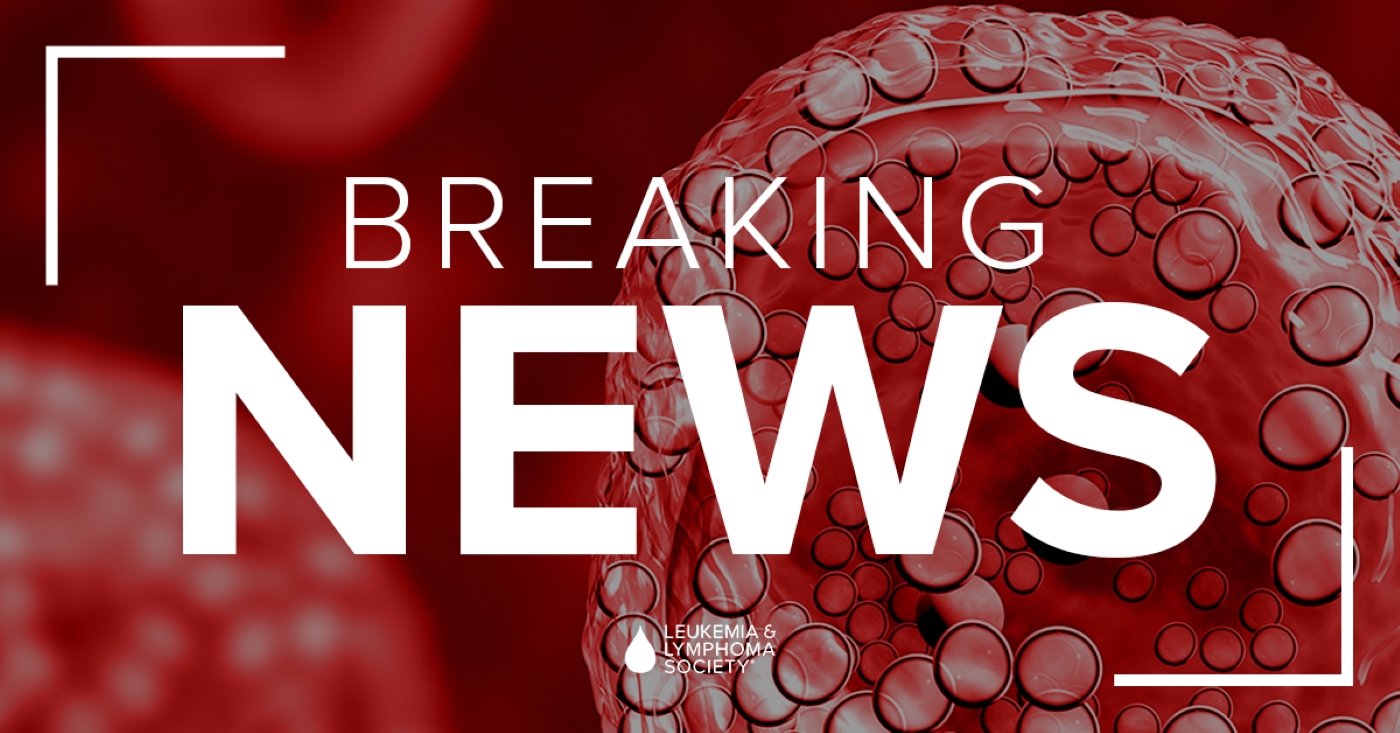Rye Brook, N.Y. (February 5, 2021) -- The U.S. Food and Drug Administration (FDA) today announced approval of a new CAR T-cell treatment for adult patients with certain forms of relapsed/refractory large B-cell lymphoma. With this latest approval, there are now four FDA-approved CAR T-cell therapies, and what was a brand-new approach introduced just three years ago, today is a mainstay in cancer care with scores of children and adults who were near death now in long-lasting remissions.
The Leukemia & Lymphoma Society (LLS) was among the earliest supporters of the CAR-T approach, which harnesses patients’ own immune system to fight their cancer. The currently approved CAR-Ts all target a protein called CD19 that is present on the surface of B cells, which is why they all work against B-cell lymphomas.
Today’s FDA approval of Breyanzi (lisocabtagene maraleucel) is the third CAR-T for large-B-cell lymphomas, including diffuse large B-cell lymphoma, which is the most common type of lymphoma. One of these CAR-Ts is also approved for children and young adults up to age 25 with acute lymphoblastic leukemia. A fourth CAR-T is approved for adults with mantle cell lymphoma.
The FDA approval of was based on results a multicenter clinical trial of more than 250 adults with refractory or relapsed large B-cell lymphoma, and the complete remission rate after treatment with Breyanzi was 54%.
Investigators will continue to follow patients to see how long the benefits lasts, but a Journal of Clinical Oncology report provides a reason to be optimistic. Researchers reported long-term results from some of the earliest large B-cell lymphoma patients, who were treated with a CAR T-cell therapy that was developed with direct support from LLS. After a single infusion of CAR T-cell therapy to patients with relapsed lymphomas, more than half have had remissions of three years or more and some remissions are up to 9 years and counting.
LLS Is Focused on Improving Access, Cost and Effectiveness of CAR-T for Even More Patients
LLS is incredibly proud that its funding, beginning in late 1990’s, laid the groundwork for CAR T-cell therapies that are now fighting several forms of blood cancer. But our work is far from done. We are supporting the next generation of CAR-T by funding research into novel approaches to make it even more effective, more accessible and useful for more types of cancer.
While CAR-T is revolutionary, there are limitations. The therapy does not work for all patients, it comes with significant (but tolerated) side-effects, it requires manufacturing of T-cells in the laboratory, is time consuming and costly. It works by harvesting the patient’s own immune cells, re-engineering them in a lab, and then growing them for several weeks before reinfusing them back into the patient.
Among the next generation treatments LLS-funded researchers are working on is “off-the-shelf” CAR-T. These use donor cells rather than the patient’s own cells, which would make treatment more widely available on demand and shave weeks of the manufacturing time, making it more cost-effective and improving efficiency.
LLS is also investing in a new CAR T-gene therapy technology that would allow CAR T-therapy to be done by simply injecting the CAR-T gene into patients, eliminating the need for laboratory manipulation of T cells. The LLS venture philanthropy arm, called Therapy Acceleration Program, recently reached an agreement with Abintus Bio, Inc. to fund work in this area. LLS is also funding Ronald Levy, MD, at the Stanford University School of Medicine who is working on an alternative gene therapy approach with a similar intent.
We are also funding research into CAR T-cell therapies targeting proteins other than CD19, including B-cell maturation antigen, or BCMA, that plays a key role in myeloma. BCMA is present on virtually all multiple myeloma cells (albeit at variable levels) but is absent from most types of B cells. This makes it an excellent target for CAR T-cell therapy because the body’s immune system can be “supercharged” to attack BCMA and the cancer cells that contain it while leaving normal B cells alone.
LLS has invested more than $50 million over more than two decades to advance CAR-T. We continue to drive innovation through support of world-class researchers at major academic medical centers including Memorial Sloan Kettering, the University of Pennsylvania, MD Anderson Cancer Center, City of Hope, Baylor College of Medicine, Emory University, the Fred Hutchison Cancer Center, and the University of Colorado.
About The Leukemia & Lymphoma Society
The Leukemia & Lymphoma Society® (LLS) is a global leader in the fight against cancer. The LLS mission: Cure leukemia, lymphoma, Hodgkin's disease and myeloma, and improve the quality of life of patients and their families. LLS funds lifesaving blood cancer research around the world, provides free information and support services, and is the voice for all blood cancer patients seeking access to quality, affordable, coordinated care.
Founded in 1949 and headquartered in Rye Brook, NY, LLS has regions throughout the United States and Canada. To learn more, visit www.LLS.org. Patients should contact the Information Resource Center at (800) 955-4572, Monday through Friday, 9 a.m. to 9 p.m. ET.
For additional information visit lls.org/lls-newsnetwork. Follow us on Facebook, Twitter, and Instagram.

